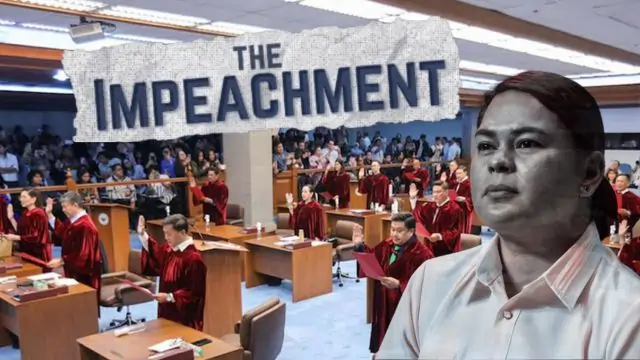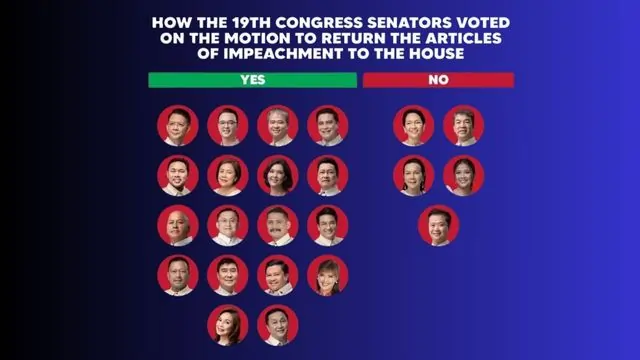The Philippine Senate convenes as an impeachment court for Vice President Sara Duterte—unfolding a political drama rich with constitutional challenges, power shifts, and historical echoes.

Sara Duterte’s Impeachment Trial: Senate Convenes in Landmark Political Moment
A Historic Day in Philippine Politics
On June 10, 2025, the Philippine Senate convened as an impeachment court to try Vice President Sara Duterte—marking only the second time since 1987 that the country’s upper chamber has stepped into this grave constitutional role. All 22 senators took their oaths as senator-judges, transforming the legislative chamber into a courtroom, and signaling the start of what may become a defining political trial of the decade.
The Immediate Twist: Senate Remands Case to House
Vote to Return Articles of Impeachment
In a surprising procedural move, the Senate voted 18–5 to remand the articles of impeachment trial back to the House of Representatives. The rationale? The impeachment documents may contain legal inconsistencies that could jeopardize a fair trial.
This decision temporarily paused the trial—much to the confusion of political observers, who expected proceedings to begin immediately.

Legal and Constitutional Debate
The controversy centers around constitutional interpretation. Article XI of the 1987 Constitution specifies the process for impeachment trial but does not explicitly allow the Senate to “return” articles to the House.
Interesting Fact:
The Constitution allows only three officials—President, Vice President, and Supreme Court Justices—to be removed via impeachment impeachment trial. This reinforces the high stakes involved.
Senator Risa Hontiveros decried the remand as a “dangerous precedent.” Others, like Senator Alan Peter Cayetano, insisted that the Senate was merely exercising caution, not derailing the process.
Why the Sara Duterte Impeachment Trial Matters
Rooted in Political Tensions
This case goes far beyond legal jargon—it’s a flashpoint in the ongoing rivalry between two of the Philippines’ most powerful political dynasties: the Dutertes and the Marcoses. Their uneasy alliance in the 2022 elections is now fracturing publicly.
Vice President Duterte is accused not just of corruption and misuse of confidential funds, but also of sowing division within the administration. These accusations come amid her growing public criticism of President Marcos Jr.
Political Insight:
Analysts say this is the first major test of the so-called “Uniteam” alliance. If Duterte falls, the Marcos bloc may solidify control ahead of the 2028 presidential race.
A Precedent-Setting Case
Should she be found guilty, it would be the first successful impeachment trial of a sitting Vice President in modern Philippine history. If acquitted, however, Duterte could emerge even more popular—potentially transforming her into a political martyr.
Fun Fact:
Former Vice President Jejomar Binay also faced corruption allegations, but no articles of impeachment were filed against him.
The Legal Process: What Comes Next?
Summons Issued Despite Remand
Despite the procedural snag, Senate President Francis Escudero issued a writ of summons requiring VP Duterte to respond within 10 days. Legal analysts suggest this move preserves the integrity of the process, even while awaiting the House’s next move.
Timeline Moving Forward
With Congress adjourning on June 13 and reconvening in late July, most insiders expect revised articles to be filed by early August. This delay sets the stage for a politically charged second half of 2025.
Public Sentiment and Political Ramifications
Divided Reactions
The Filipino public is sharply divided—echoing the polarization seen in other high-profile political dramas. Pro-Duterte supporters argue that the impeachment trial is a Marcos-led power play. Meanwhile, critics view the proceedings as a long-overdue accountability mechanism.
Online Buzz:
Trending hashtags include #DefendSara, #ImpeachSaraNow, and #RuleOfLawPH, reflecting the deeply fractured political discourse.
Implications for the 2025 Midterm Elections
Whether or not the trial proceeds, it will dominate political conversation in the run-up to the 2025 midterm elections. Expect candidates to leverage the trial in their campaigns, either to portray Duterte as a victim of persecution or as a symbol of unchecked abuse.
The Broader Picture: Strengthening or Weakening Institutions?
A Test of Constitutional Democracy
More than a clash between political titans, this trial tests the resilience of democratic institutions in the Philippines. How the House and Senate navigate this will define their credibility and the rule of law for years to come.
Historical Parallel:
The Corona impeachment trialin 2012 led to a surge in public interest in constitutional processes. Will this trial spark similar civic engagement?
Time for Legal Reform?
The events of June 10 have revealed potential gaps in constitutional procedure. Should the Senate be allowed to remand articles? What constitutes “sufficient form and substance”?
Legal experts suggest it may be time to update the impeachment trial rules—either through judicial clarification or supplemental legislation.
Conclusion: The Calm Before the Storm
Vice President Sara Duterte’s impeachment has thrust the Philippines into uncharted political and constitutional territory. While the Senate has temporarily paused its trial duties, the embers of this legal showdown are still hot.
The next few months promise drama, division, and potentially, constitutional history. With the 2025 elections looming, and the shadow of 2028 already visible, this case could realign political forces in ways no one fully expects.
Follow us for more!
